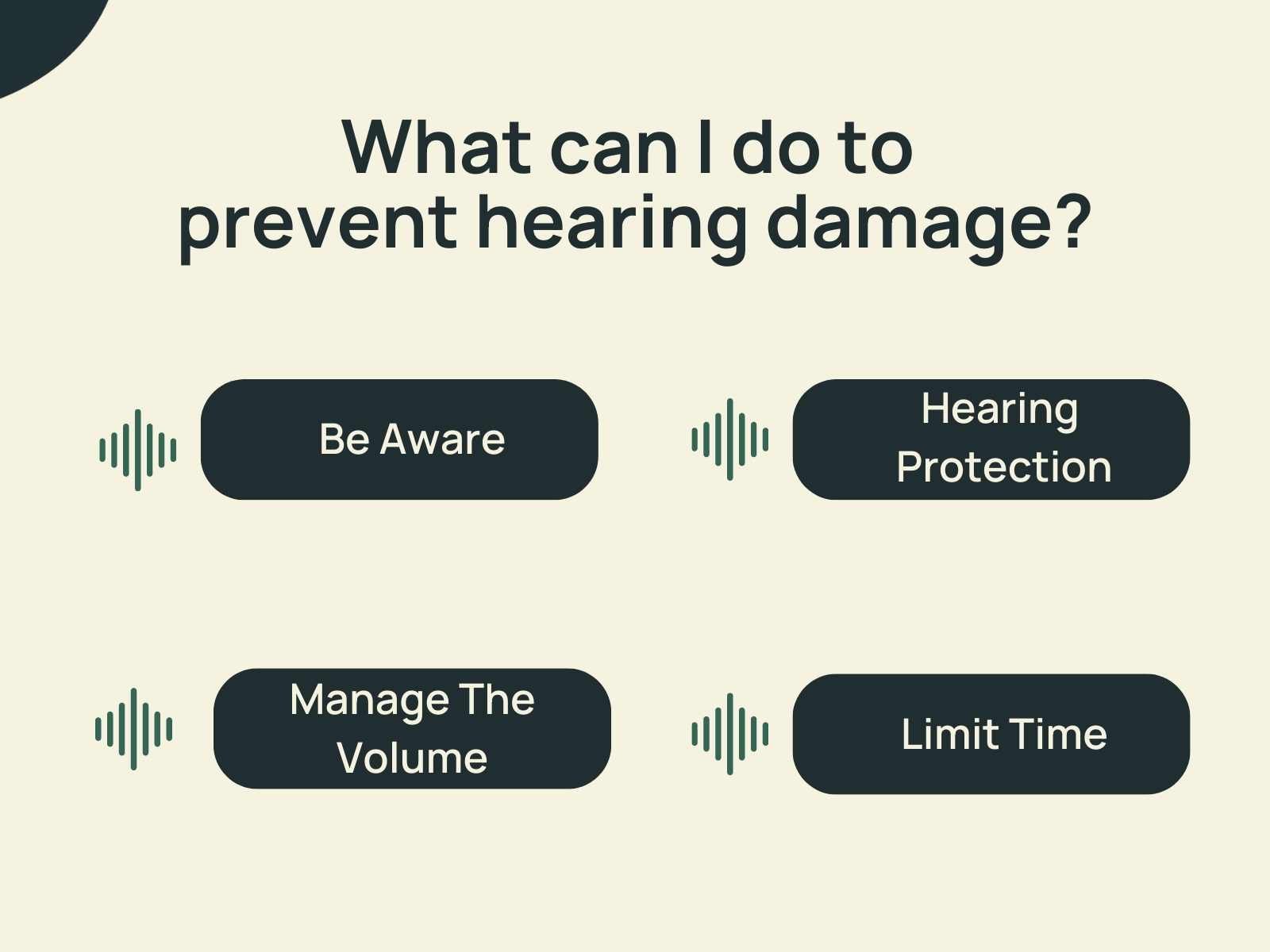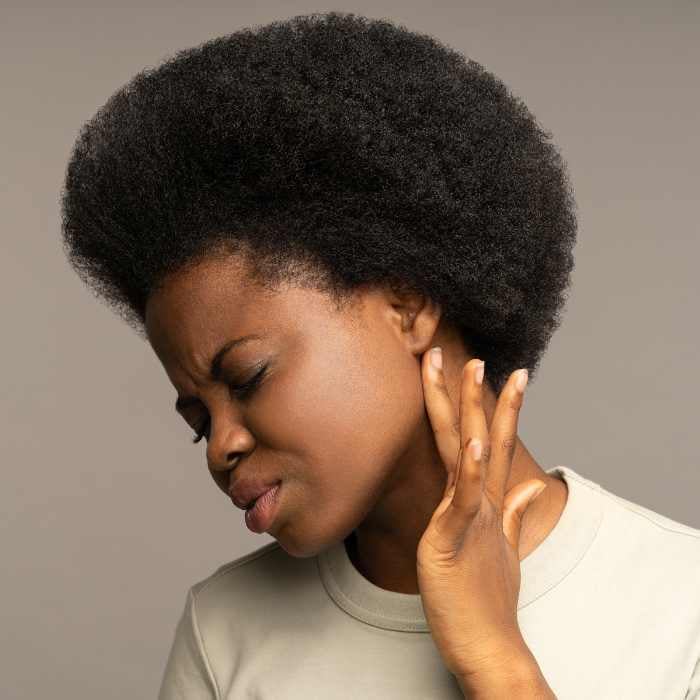Key Takeaways:
- Acoustic trauma can occur from a single, loud noise exposure or loud noise over a period of time.
- One sign of acoustic trauma is ringing in the ears and muffled hearing after a loud sound exposure.
- There is currently no cure for permanent hearing damage.
- The best way to preserve hearing is through prevention of noise trauma with hearing protection in loud environments, safe headphone listening levels, and awareness about the decibel level of your environment (i.e., using a free decibel app).
.png)
Hearing is one of our most precious senses, yet sometimes we take it for granted. Exposure to loud noise is one of the leading causes of hearing damage and can profoundly impact our lives. In some cases hearing damage occurs over years of repeated noise exposure. In other cases, hearing loss can happen in a single exposure.
Acoustic trauma is a sudden and rapid onset change in hearing after exposure to loud noise.
Acoustic trauma can cause temporary or permanent hearing loss, relentless ringing in the ears, and reduce our quality of life. However, there are ways to protect your hearing and prevent acoustic trauma or prevent further damage.
In this article, we'll discuss the signs of acoustic trauma, what causes hearing damage, and how to avoid it.
Signs of Acoustic Trauma

Imagine you're at a concert, jamming out to your favorite artist (Taylor Swift, anyone?). The music is pumping, your friends are beside you, and it's a blast.
But amidst the noise and chaos, you struggle to understand what your friends are saying. The music, the crowd, and the fog horns drown out their words. As you leave the concert, it feels like your ears are stuffed with cotton and there's a constant ringing in the background.
Sound familiar? These are signs of acoustic trauma.
You may experience a ringing sensation in your ears, tinnitus, a feeling of pressure or fullness in your ears, and muffled hearing. You might need to ask others to repeat themselves multiple times, as speech isn't clear at even normal volume. If any of this sounds familiar, you've likely experienced acoustic trauma.
What Causes Hearing Damage
Our auditory system is pretty amazing. And while I'm saying this as an audiologist, I bet you'd agree too. Just look at this impressive animation of how the hearing pathway works.
Our ears do so much for us, but they're also very delicate and susceptible to damage. We don't see the air molecules and pressure waves around us as they create sound, but those very invisible forces can damage the delicate machinery in the inner ear.
The inner part of the ear has a unique ecosystem. Here’s how the inner ear works and is susceptible to acoustic damage:
⭐ As sound moves through the ear and auditory pathway, tiny hair cells in the cochlea spring into action and trigger movement, which then creates electrical signals that travel to the brain.
⭐ These tiny, delicate hair cells can get damaged after too much exposure to loud noise, leading to hearing loss.
⭐ Sometimes these cells can rally, and you'll notice that the post-concert hearing hangover dissipates within a few days. Repeated exposure to loud noise can also lead to progressive hearing loss over time as the hair cells can't keep up.
So what sounds specifically cause damage? Some obvious culprits include loud noises like gunfire, concerts, and jackhammers.
Unfortunately, the inner ear can sustain permanent damage from even seconds or minutes of these loud sounds at close range. But, sounds don't have to be as loud as a jackhammer to cause harm.
Listening to your headphones at maximum volume for just 15 minutes can also be damaging (yes, really). Even household appliances such as hair dryers and blenders can lead to acoustic trauma if you're exposed to them for hours each day.
Most of us would experience noise-induced hearing loss with regular concert going or exposure to other loud sounds for an extended time.
Some people, such as those taking chemotherapy drugs, are more prone to noise-induced hearing loss. (FYI: These medications can cause a synergistic effect, which worsens noise damage.)
The truth is that exposure to loud noises can be harmful to anyone.
Is there a cure?
Research is still working on how to regenerate inner hair cells. Currently, once hair cell damage is done, hearing loss is irreversible. The best way to prevent acoustic trauma is to protect your hearing before damage is done.
How to Prevent Hearing Damage

You can take various measures to protect your hearing from loud noise. Let's get to it.
Awareness
As with most health interventions, it's helpful to understand some guidelines.
If you're not used to thinking about the volume of sounds, using a decibel app helps to gauge what is ok and where you'll want to take precautions. The loud conversation usually comes in at 70 decibels, which is safe to listen to all day.
Though, once sounds climb above 80 decibels, moderation is key. Apple Health also features volume checks that send warnings when the volume is too loud for too long.
Turn It Down
When you have control of the volume, keep it at a safe level. Listening at 60 - 70% of the maximum is best.
Can you limit volume in your life? Yep, just go to your smartphone. In your phone settings, there are ways to limit the maximum volume so that even when your favorite song comes on, you won't be tempted to crank it up to dangerous levels.
Now if you're wearing regular headphones, keep the volume low enough that you can hear someone talking to you at about arm's length.

Another option is noise-canceling headphones. Using noise-canceling headphones, designed to minimize external noise, allows you to listen to audio at a significantly lower volume because you'll get less background noise.
Protect Your Ears
Hearing protection is another great option. Using your earplugs lets you enjoy that Taylor Swift concert without the noise-induced hearing hangover afterward.
Are you worried about earplugs cramping your style? I love Loop earplugs for their functionality and style (plus many fun color options!). You can take a look at a few other options here.
Limit Your Exposure
In situations when you can't control the volume, it's best to limit the amount of time you spend exposed to loud noise. Taking breaks can help too. If you're at a loud event, you can find quiet areas to give your ears a break. Or, limit how many hours you will be there to minimize noise exposure.
Conclusion
Maintaining good hearing health is not a passive endeavor but an active pursuit. By understanding the causes of hearing loss, particularly noise-induced hearing loss, we're better equipped to protect our ears from harmful sounds. Whether it's turning down the volume, limiting exposure to loud noises, or investing in hearing protection, there are ample ways to safeguard our auditory system. Remember, our hearing is a precious gift that allows us to connect with the world around us. Let's do our part to keep it safe and sound.






